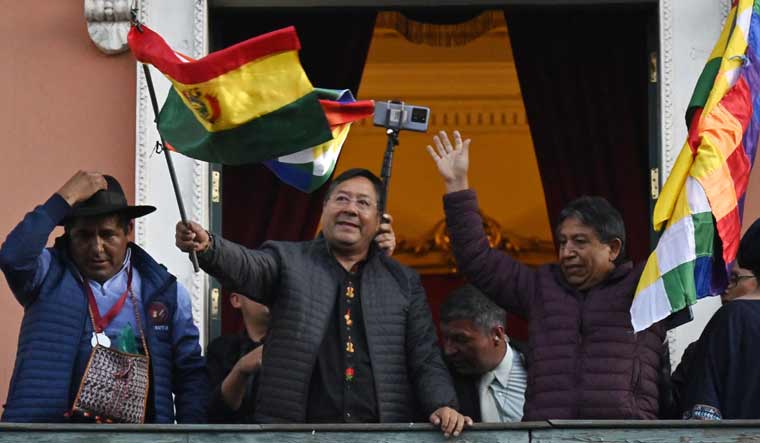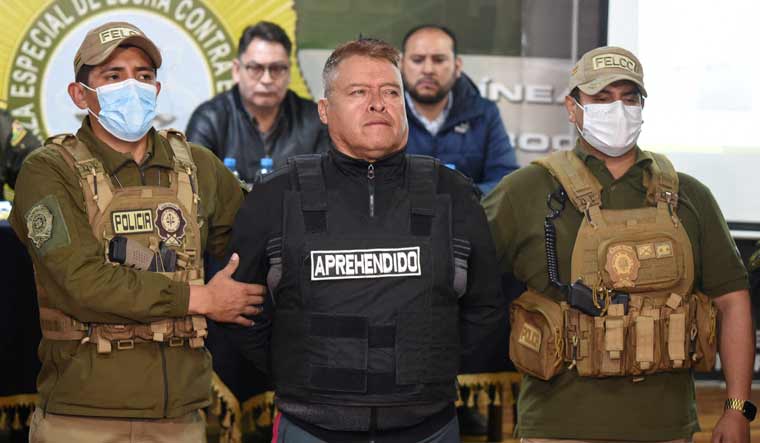On Wednesday, hundreds of troops and armoured vehicles took position outside Bolivia’s government palace in an attempted coup led by a top general who vowed to "restore democracy." Over 12 million Bolivians watched as one armoured vehicle smashed down the main gate of the presidential palace, allowing soldiers to enter.
But President Luis Arce immediately took control of the situation, ordering the troops to stand down. Arce directly addressed the general commander of the army — Juan José Zúñiga, who appeared to be leading the rebellion. "I am your captain, and I order you to withdraw your soldiers, and I will not allow this insubordination."
Soon the soldiers began pulling back, along with a line of military vehicles, ending the rebellion. Gen Zúñiga was arrested after the attorney general opened an investigation. Besides Zúñiga, former Navy Vice Adm. Juan Arnez Salvador was also taken into custody. Both men were dismissed by President Luis Arce and replaced after the uprising began.
 Bolivian President Luis Arce waves a Bolivian flag at the balcony of the Government Palace in La Paz | AFP
Bolivian President Luis Arce waves a Bolivian flag at the balcony of the Government Palace in La Paz | AFP
Arce also swore in Jos Wilson Sanchez as the military commander, Zuniga's former role. He called for calm and order to be restored. "I order that all personnel mobilized on the streets return to their units," Sanchez said. "We entreat that the blood of our soldiers not be spilt."
As pro-democracy demonstrators took to the streets in support of the government, the President gave a televised speech, calling on the public to "organise and mobilise... in favour of democracy". "We cannot allow once again coup attempts to take Bolivian lives," he said.
Gen Zúñiga's exact motivations for launching the coup remain unclear though he came openly to the public condemning Bolivia's former president, Evo Morales, during an interview the previous day. Gen Zúñiga said he would arrest Mr Morales if he ran for office again next year. Mr Morales was forced out of office in 2019 by military chiefs who said he was trying to manipulate the result of a presidential election, sending him into exile in Mexico.
Government Minister Eduardo del Castillo said the group’s goal was to overturn the democratically-elected authority. Defense Minister Edmundo Novillo said everything is now under control. Surrounded by the new military chiefs appointed by Arce, Novillo said that Bolivia lived a "failed coup."
The coup attempt came as Bolivia faced months of tensions and political fights between Arce and Morales, who was his one-time ally. The country also faces an economic crisis.
Though Arce and Morales do not see eye to eye, both are vehemently united against military takeovers of democratically elected governments. Before Morales took power in 2005, Bolivia was one of the most politically volatile nations in the Americas and had brought much-needed stability to the nation.
However, in 2019, Morales tried to bypass the constitution and seek a fourth term. He went on to win the vote, but he was forced to resign and flee the country after violent protests.
While centre-right Jeanine Áñez took over as the country's interim leader between 2019-20, she too ended up in jail over a coup charge. The incumbent president, Mr Arce, went on to win a re-run vote in 2020.
Morales react
Morales, head of the ruling MAS socialist party, said that his supporters would mobilize in support of democracy. "We will not allow the armed forces to violate democracy and intimidate people," Morales said.


